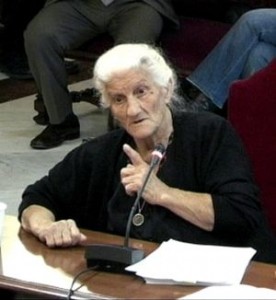Franco’s victims get their day in court (sort of)

María Martín López, 81, testifies before Spain's Supreme Court this past Wednesday about the forced disappearance of her mother 75 years ago.
Many thought the day would never come. And yet this past week, a handful of aging victims of Francoist repression appeared before Spain’s Supreme Court to tell the horrifying stories of how their parents or grandparents were dragged from their houses and shot by Franco’s forces during the Spanish Civil War. In other testimony, an historian told the Court that these acts of violence were part of a systematic plan that had been hatched long in advance of the military coup of July 1936. None of this was news in itself–victims and historians have been telling these stories for decades, and with increasing frequency and intensity since the late 1990s. What was new was the setting: They had been called as witnesses before Spain’s highest court. A casual observer might well have concluded that Spain had finally gone the route that countries like Chile and Argentina took years ago: A wide-scale judicial inquiry into the crimes committed under the dictatorship, with the goal of producing a report such as the Argentine Rettig Report or the Chilean Valech Report.
The irony, of course, is that these victims were called as witnesses in the trial against the judge who dared to initiate precisely such an inquiry, Baltasar Garzón. A conviction of Garzón, which is likely, would be a major step backward in the worldwide fight against impunity, and an assault on judicial independence in Spain and elsewhere, as human rights experts have stated. And yet: Seeing Franco’s victims testify before the Supreme Court could be read as a tiny speck of progress in a depressingly regressive landscape.












